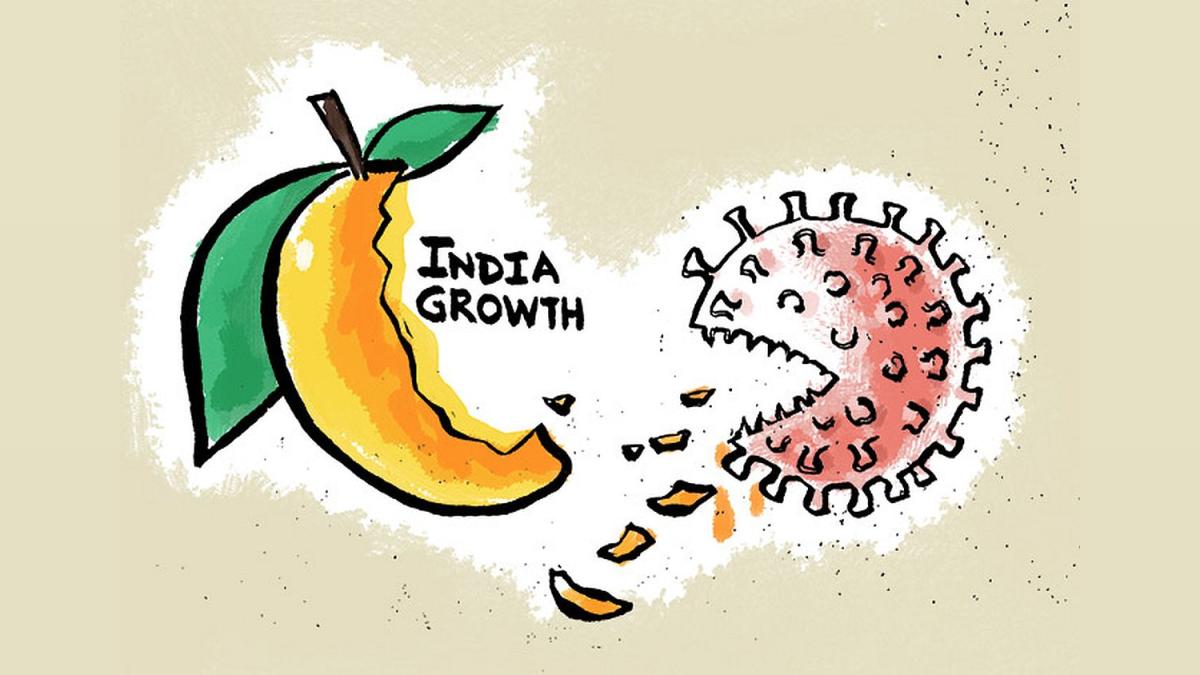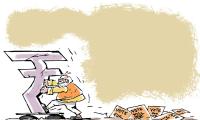India Economy Projected to Grow 6.5-7% Annually Through 2027 - S&P
S&P Global Ratings forecasts India's economy to expand between 6.5-7% annually until 2027, driven by infrastructure spending and private consumption. The agency also expects strong asset quality for banks due to healthy corporate balance sheets and tighter underwriting standards.

Illustration: Dominic Xavier/Rediff.com
New Delhi, Nov 14 (PTI) S&P Global Ratings on Thursday projected the Indian economy to grow between 6.5-7 per cent annually in the three fiscal years till March 2027 as infrastructure spending and private consumption drive growth momentum.
In its global bank outlook report, S&P also said that good economic growth prospects will continue to support banks' asset quality, while healthy corporate balance sheets, tighter underwriting standards and improved risk management practices will further stabilise asset quality.
It said structural improvements and good economic prospects will support the resilience of India's financial institutions.
"India's infrastructure spending and private consumption will support robust economic growth. We forecast GDP will expand 6.5-7.0 per cent annually in fiscal years 2025-2027 (year ending March 31). India's good economic growth prospects will continue to support banks' asset quality," S&P said.
For the current fiscal, the Reserve Bank has projected economic growth to be 7.2 per cent, lower than 8.2 per cent in 2023-24.
It said higher demand coupled with stronger bank capitalisation will boost bank loan growth but deposit growth will lag.
"We project the banking sector's weak loans will decline to about 3 per cent of gross loans by March 31, 2025, from our estimate of 3.5 per cent as of March 31, 2024. This is on the back of healthy corporate balance sheets, tighter underwriting standards, and improved risk-management practices," it said.
S&P said corporate borrowing has gained momentum, but uncertain external conditions may delay capital expenditure-related growth. Deposits may struggle to keep pace, which would weaken credit-to-deposit ratios. Despite this, banks' overall funding profiles should remain sound.
Underwriting standards for retail loans in India are healthy, and delinquencies in this segment remain manageable. However, unsecured personal loans have grown rapidly and could contribute to incremental nonperforming loans, it added.
The US-based rating agency further said that the RBI is becoming more vocal and imposing heavy penalties on banks as it focuses on technology, compliance, customer complaints, data privacy, governance, and know-your-customer issues.
"We believe increased transparency will enhance compliance and governance practices and curtail lenders' overexuberance, but compliance costs will rise. Investors in the financial sector may seek a higher premium for the increased regulatory risk stemming from the potential for tighter penalties..." S&P said.
In its global bank outlook report, S&P also said that good economic growth prospects will continue to support banks' asset quality, while healthy corporate balance sheets, tighter underwriting standards and improved risk management practices will further stabilise asset quality.
It said structural improvements and good economic prospects will support the resilience of India's financial institutions.
"India's infrastructure spending and private consumption will support robust economic growth. We forecast GDP will expand 6.5-7.0 per cent annually in fiscal years 2025-2027 (year ending March 31). India's good economic growth prospects will continue to support banks' asset quality," S&P said.
For the current fiscal, the Reserve Bank has projected economic growth to be 7.2 per cent, lower than 8.2 per cent in 2023-24.
It said higher demand coupled with stronger bank capitalisation will boost bank loan growth but deposit growth will lag.
"We project the banking sector's weak loans will decline to about 3 per cent of gross loans by March 31, 2025, from our estimate of 3.5 per cent as of March 31, 2024. This is on the back of healthy corporate balance sheets, tighter underwriting standards, and improved risk-management practices," it said.
S&P said corporate borrowing has gained momentum, but uncertain external conditions may delay capital expenditure-related growth. Deposits may struggle to keep pace, which would weaken credit-to-deposit ratios. Despite this, banks' overall funding profiles should remain sound.
Underwriting standards for retail loans in India are healthy, and delinquencies in this segment remain manageable. However, unsecured personal loans have grown rapidly and could contribute to incremental nonperforming loans, it added.
The US-based rating agency further said that the RBI is becoming more vocal and imposing heavy penalties on banks as it focuses on technology, compliance, customer complaints, data privacy, governance, and know-your-customer issues.
"We believe increased transparency will enhance compliance and governance practices and curtail lenders' overexuberance, but compliance costs will rise. Investors in the financial sector may seek a higher premium for the increased regulatory risk stemming from the potential for tighter penalties..." S&P said.
You May Like To Read
TODAY'S MOST TRADED COMPANIES
- Company Name
- Price
- Volume
- Vodafone-Idea
- 11.29 ( -0.62)
- 48969065
- Shish-Industries
- 9.19 ( -6.61)
- 44329574
- Sylph-Technologies
- 1.05 (+ 8.25)
- 29794426
- Welcure-Drugs-and
- 0.47 ( -2.08)
- 27870008
- Sunshine-Capital
- 0.27 (+ 3.85)
- 13428760






